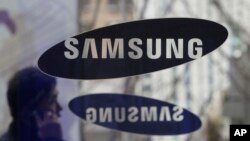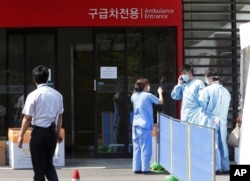There is growing concern in South Korea that the U.S.-led Trans-Pacific Partnership (TPP) could further hurt the country's economy, which is already experiencing a steep drop in exports and slow growth.
South Korea has focused on developing bilateral free trade agreements (FTA) with other countries, including the world’s two largest economies, the United States and China.
These bilateral FTAs gave some South Korean industries a competitive advantage over their chief rivals in Japan, particularly in automobile manufacturing and the production of televisions, computers, mobile phones and other technology products.
The U.S.-Korea FTA eliminated import and export tariffs on automobiles and reduced them on electronics and other technology products.
Losing competitive edge
But the Korea International Trade Association recently said in a report that the TPP would give Japan the competitive edge over South Korea in trade with other members of the 12-country free trade pact.
“Then maybe Korea’s preference [or advantage] that we had, will be eroded in some sectors such as automobiles or machines and other products where we compete with Japan,” said Je Hyun-jung, the KITA senior researcher who authored the report.
The TPP members are the United States, Japan, Australia, Brunei, Canada, Chile, Malaysia, Mexico, New Zealand, Peru, Singapore and Vietnam.
These countries account for 40 percent of the world’s economy. Once ratified, the agreement will eliminate more than 18,000 tariffs on American exports alone and will establish strict labor, environmental and anti-corruption regulations.
Export slump
The world's sixth-largest exporter, South Korea rattled financial markets in January when it reported its biggest slump in more than six years.
South Korean exports declined in the last 13 months and January’s 18.5 percent drop represents the sharpest monthly plunge since 2009.
The Korean Trade Ministry blames China’s economic slowdown and lower oil prices for the reduced global demand.
Other trade-oriented Asian economies, such as China and Taiwan, have also seen a reduction in exports in the last year.
South Korea's gross domestic product expanded just 2.6% in 2015, short of the expected three percent growth rate for the first time in two years, according to the Bank of Korea.
Other factors like the MERS outbreak last year, which hurt the tourism industry, and a slowing housing market also contributed to the slow economic growth that South Korea is experiencing.
Stimulus programs
The Bank of Korea is under increasing pressure to reduce its key lending rate below the current 1.5 percent rate to encourage spending despite concerns that it would also increase debt.
The Bank of Japan recently adopted a rate of negative 0.1 percent.
President Park Geun-hye and her conservative allies have been pushing a business friendly agenda to make the South Korean economy more competitive.
Recently they were able to pass corporate restructuring legislation in the South Korean National Assembly that will reduce regulations and provide tax cuts to South Korean companies.
The legislature remains divided over a controversial labor market reform bill that would make it easier for employers to fire workers.
This proposed measure sparked mass rallies last year that turned violent when protesters fought police with steel pipes and police used water cannons and barricades to stop the crowd.
President Park’s strong response in banning demonstrations and arresting labor leaders raised concerns among human rights advocates that the young South Korean democracy was returning to past authoritarian ways.
“I sense a trend of gradual regression on the rights to freedom of peaceful assembly and of association, not a dramatic shutdown of these rights, but a slow creeping inclination to degrade them,” said Maina Kiai, the United Nations Special Rapporteur on the rights to freedom of peaceful assembly and of association.
TPP work around
In addition to the tariff reductions that TPP members will gain from trading amongst themselves, high wage countries like Japan can further leverage that advantage by increasing production line operations in low wage member counties like Vietnam.
KITA says South Korea should also follow suit and move more of its production line operations to low wage member countries to gain the advantages of exporting from a TPP member.
“Many Korean companies are already investing a lot in Vietnam’s market so that Korean companies in Vietnam can export to the US or other TPP member countries,” said KITA senior researcher Je Hyun-jung.
The Korea International Trade Association is advocating for South Korea to join the TPP as soon as the group opens its membership to outside countries.






